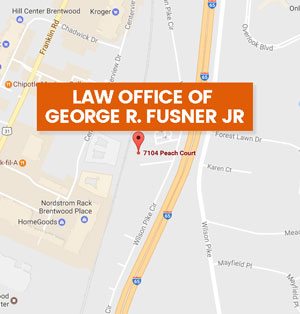Whiplash is one of the most common car wreck injuries. It is classified as a soft tissue injury and develops as a result of a sudden jerking of the head and neck.
The medical term for whiplash is cervical acceleration/deceleration syndrome, and its effects can range from mild to severe. If left untreated, a severe case of whiplash can have lasting repercussions and may even limit your mobility permanently.
Since the symptoms of whiplash are not always apparent immediately following impact, crash victims who are suffering from it may not necessarily seek medical attention. The sooner you start treating whiplash, though, the better the prognosis and the lower your risk of suffering lasting damage.
If you sustained head or neck injuries in a collision that was not your fault, contact the Law Office of George R. Fusner Jr. Mr. Fusner has been a practicing attorney since 1977, and he received his law degree from the prestigious Vanderbilt University School of Law. Call 615-251-0005 or 800-427-8960 to schedule a free case evaluation with an experienced lawyer in Nashville.
What Are Common Symptoms of Whiplash Following a Collision?
Whiplash does not always manifest symptoms right after a collision. In fact, it can take 24 hours or more for the earliest symptoms to arise; however, once they do, they can be debilitating. According to WebMD, some of the most common symptoms include:
- Neck pain or stiffness;
- Shoulder pain;
- Upper back pain;
- Lower back pain;
- Headaches;
- Dizziness;
- Numbness or pain in the hands or arms;
- Poor concentration;
- Irritability; and
- Sleep disturbances.
How Do You Treat Whiplash?
If you sustained whiplash in a car crash, the most effective treatment approach is going to depend on the extent of your condition. Although researchers have not found a single comprehensive cure, a variety of medical interventions can ease the worst of the symptoms while facilitating the body’s natural healing process.
Effective treatment approaches for whiplash include:
- Pain relievers and anti-inflammatory medication;
- Gentle exercise;
- Physical therapy;
- Massage;
- Heat and ice applications; and
- Corticosteroid injections.
What Are the Long-Term Effects of Whiplash?
Depending on the severity of the condition, the symptoms of whiplash can last for anywhere from a few days to several years. When symptoms persist for more than six months, doctors typically refer to the condition as chronic whiplash and may treat it with prescription pain relievers, muscle relaxants, and physiotherapy. Some patients also find relief through alternative treatment approaches like acupuncture, chiropractic care, and electronic nerve stimulation.
Without treatment, chronic whiplash can cause:
- Jaw pain;
- Severe headaches;
- Constant fatigue;
- Trouble sleeping;
- Irritability;
- Ringing in the ears;
- Memory problems; and
- Poor concentration.
If you sustained whiplash in a collision with a drunk or distracted driver and you are concerned about the effects it could have on your life, contact the Law Office of George R. Fusner Jr. Mr. Fusner will put his 40 years of experience to work for you so you can secure the largest settlement possible for the damages you incurred.
Call 800-427-8960 or 615-251-0005 to schedule a free consultation with a car wreck attorney in Nashville. You can learn more about car accident claims in Tennessee by visiting the USAttorneys website.





